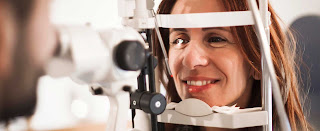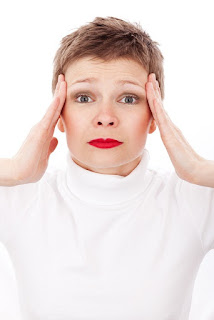Aging Eyes: What To Expect As You Get Older
- Get link
- X
- Other Apps

As we age, our eyes undergo several changes that affect our vision. It's a natural process that occurs gradually and can start as early as our 40s. These changes can be caused by several factors, including genetics, lifestyle habits, and environmental factors. Understanding the aging process of the eyes is crucial in maintaining good eye health and preventing age-related eye diseases.
In this text, we'll explore what to expect as you get older and how you can take care of your eyes to ensure optimal visual function throughout your life.
As we age, our eyes undergo various changes that can affect our vision. In our 40s and 50s, many people experience presbyopia, which is a natural decline in the eye's ability to focus on nearby objects. This can make it difficult to read small print or work on a computer for extended periods of time. Additionally, some people may notice a decrease in color perception and contrast sensitivity.
The risk of developing age-related eye diseases such as cataracts and glaucoma also increases during this time period. Regular eye exams are important to catch any potential issues early on and maintain good vision as we age.
Vision changes in your 60s and beyond are common and expected. You may notice an increased difficulty with reading small print, distinguishing between colors, and adjusting to changes in lighting. Glare from headlights or bright sunlight can also become more problematic. Cataracts, a clouding of the lens of the eye, may develop and cause blurred vision or sensitivity to light. Age-related macular degeneration (AMD) is another common issue that can result in a loss of central vision.
It is important to have regular eye exams as you age to monitor any changes in your vision and address any concerns promptly.
As we age, our eyes undergo several changes that can affect our vision. Some of the most common eye conditions that become more prevalent with age include presbyopia, cataracts, glaucoma, and age-related macular degeneration (AMD). Presbyopia is a condition where the lens of the eye becomes less flexible, making it difficult to focus on nearby objects. Cataracts are cloudy areas that develop in the lens of the eye and can cause vision loss.
Glaucoma occurs when pressure builds up in the eye and damages the optic nerve. AMD is a progressive disease that affects central vision and can lead to blindness if left untreated.
As we age, our eyes undergo several changes that can impact our vision. However, there are steps we can take to maintain good eye health as we get older. Firstly, regular eye exams are crucial for detecting any age-related eye diseases early on. Secondly, protecting your eyes from harmful UV rays by wearing sunglasses with UVA and UVB protection is important.
Additionally, a healthy diet rich in vitamins A, C, E and omega-3 fatty acids can help prevent age-related macular degeneration. Finally, quitting smoking and managing chronic conditions such as diabetes can also benefit eye health in the long term.
In this text, we'll explore what to expect as you get older and how you can take care of your eyes to ensure optimal visual function throughout your life.
As we age, our eyes undergo various changes that can affect our vision. In our 40s and 50s, many people experience presbyopia, which is a natural decline in the eye's ability to focus on nearby objects. This can make it difficult to read small print or work on a computer for extended periods of time. Additionally, some people may notice a decrease in color perception and contrast sensitivity.
The risk of developing age-related eye diseases such as cataracts and glaucoma also increases during this time period. Regular eye exams are important to catch any potential issues early on and maintain good vision as we age.
Vision changes in your 60s and beyond are common and expected. You may notice an increased difficulty with reading small print, distinguishing between colors, and adjusting to changes in lighting. Glare from headlights or bright sunlight can also become more problematic. Cataracts, a clouding of the lens of the eye, may develop and cause blurred vision or sensitivity to light. Age-related macular degeneration (AMD) is another common issue that can result in a loss of central vision.
It is important to have regular eye exams as you age to monitor any changes in your vision and address any concerns promptly.
As we age, our eyes undergo several changes that can affect our vision. Some of the most common eye conditions that become more prevalent with age include presbyopia, cataracts, glaucoma, and age-related macular degeneration (AMD). Presbyopia is a condition where the lens of the eye becomes less flexible, making it difficult to focus on nearby objects. Cataracts are cloudy areas that develop in the lens of the eye and can cause vision loss.
Glaucoma occurs when pressure builds up in the eye and damages the optic nerve. AMD is a progressive disease that affects central vision and can lead to blindness if left untreated.
As we age, our eyes undergo several changes that can impact our vision. However, there are steps we can take to maintain good eye health as we get older. Firstly, regular eye exams are crucial for detecting any age-related eye diseases early on. Secondly, protecting your eyes from harmful UV rays by wearing sunglasses with UVA and UVB protection is important.
Additionally, a healthy diet rich in vitamins A, C, E and omega-3 fatty acids can help prevent age-related macular degeneration. Finally, quitting smoking and managing chronic conditions such as diabetes can also benefit eye health in the long term.
- Get link
- X
- Other Apps



Comments
Post a Comment